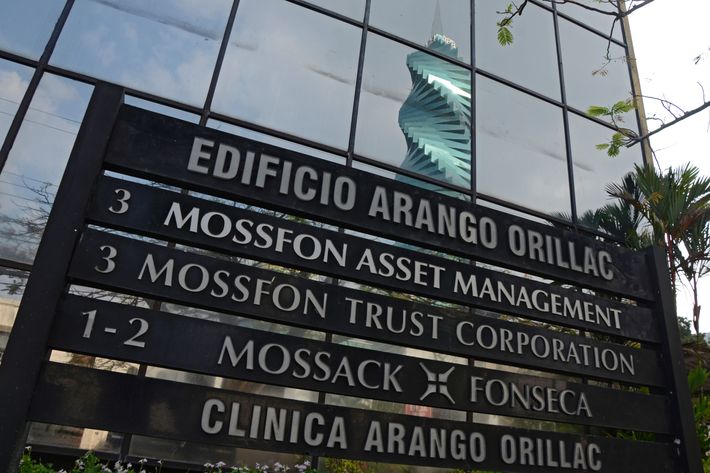
There are ways of reducing inequality in America that are too politically toxic to be implemented any time soon. For example, the government could stop subsidizing upper-middle-class families’ mortgages and give the savings to unemployed poor people. Or we could enact a land-value tax, which would drastically lower the cost of housing by socializing the value of the land on which it’s built. Even less extreme redistributive programs with the potential to benefit all, like single-payer health care, face the hurdle of pitting the immediate interests of one large swath of Americans — those who already have private insurance that they like and are afraid to lose — against those of the less fortunate.
But cracking down on tax havens? Punishing plutocrats and corporations who circumvent our tax laws with the help of scheming lawyers that no working family can afford? That’s as politically risky as wearing an American flag pin. Sure, taking aggressive action against tax shelters threatens the interests of one small group of Americans, but so does outlawing homicide. And forcing the superrich to pay their taxes is about as popular as preventing murder. Happily, this politically convenient target for populist rage just got lit up with a big spotlight: Over the weekend, news outlets across the globe began publishing the “Panama Papers,” a 2.6-terabyte trove of confidential documents from a Panamanian law firm that specializes in helping the wealthy avoid their tax burdens.
According to Pew Research Center, Americans’ No. 1 complaint with their tax system — ranking way ahead of “I pay too much” — is “the feeling that some wealthy people get away with not paying their fair share.” Even among Republicans that complaint ranked second after “the complexity of the tax system,” which implies a similar concern with fairness, albeit in less populist language. And tax avoidance is one of the few issues that unite the American left and the “small-business community,” which believes that multinational corporations’ talent for hiding money from Uncle Sam puts them at a competitive disadvantage.
Combating tax evasion isn’t just good politics or a symbolic gesture with little real-world consequence. At least $8 trillion, or around 8 percent of all the world’s financial assets, is going untaxed in the Cayman Islands, Panama, Switzerland, or some other shelter state, according to Berkeley economist Gabriel Zucman. (Delaware is among said “other shelter states.” More on that later.) The combined tax-dodging of jet-setters and corporations costs the U.S. at least $165 billion a year, by Zucman’s estimates — enough to fund Bernie Sanders’s plan for free tuition at public colleges twice over.
And Tuesday’s collapse of a merger between Allergan and Pfizer offers fresh proof of our government’s capacity to rein in corporate perfidy. Pfizer’s plan to buy the Dublin-based company was motivated entirely by a desire to execute a corporate inversion — a scheme by which a company “relocates” to a low-tax nation, even as the bulk of its operations remain in a high-tax one. On Monday, the Treasury Department issued new regulations that prevent Pfizer from performing such an inversion through its merger with Allergan. On Tuesday, the deal fell apart, and Allergan shares are in free fall.
And yet neither Democratic presidential candidate has offered a detailed plan for rescuing our government’s money from these freeloading oligarchs and their accomplices. But now some public-spirited soul, who happened to have access to the classified documents of a Panamanian law firm, has just given Hillary Clinton and Bernie Sanders the perfect opportunity to fill this hole in their party’s platform.
The Panama Papers expose the inner workings of Mossack Fonseca, which, despite how it may sound, is not a delicious Mediterranean entrée. If you want to know what Mossack Fonseca is all about, check out this line from one of the law firm’s (formerly) classified memos: “Ninety-five per cent of our work coincidentally consists in selling vehicles to avoid taxes.” Among the penny-pinching rich who purchased such vehicles were Iceland’s prime minister, Ukraine’s president, and pretty much everyone in Vladimir Putin’s inner circle.

These revelations are a gift that the Democratic Party needs to accept. The Panama Papers have focused global attention on a source of economic inequality that only a tiny fraction of the American public has an interest in defending — a tiny fraction that exerts outsize influence over the GOP. In case you forgot, the Republicans’ last standard-bearer was a multimillionaire who minimized his tax bill by banking in the Cayman Islands — and said that anyone who doesn’t go to such lengths to deny America revenue isn’t qualified for the presidency. As this year’s primary campaign has grotesquely illustrated, much of the Republican base has lost faith in its Establishment. Democrats can use tax-haven reform as a tool for encouraging that justified distrust: It’s hard to imagine a better way of highlighting the divergent interests of the GOP Establishment and the American public than by forcing Paul Ryan to block the Superrich Should Pay Their Fair Share Act of 2016. And make no mistake: The Kochs’ favorite legislator will block it. In 2011, Ryan told American Business magazine that the best way to combat wealth offshoring was to “make this country a tax shelter for other countries instead of having other countries be a tax shelter for America.” Make America Luxembourg again.
To be sure, drafting effective anti-tax-haven legislation will come with challenges. Tracking the global movement of private capital is no easy task. But researchers have generated a host of policies for making it easier. Zucman, who wrote the (recently released, critically acclaimed) book on tax havens, has proposed an international financial registry. In the United States, the Depository Trust Company registers the owners of stocks and bonds in order to facilitate electronic payments. The U.K. and Europe have similar systems. Thus, creating an international financial registry would be a political challenge, but not a technical one: You just have to give governments access to these preexisting registries and check tax returns against them. More immediately, Zucman recommends sanctions against money-laundering nations. As for corporate tax evasion, he proposes that we stop taxing companies based on where they reside geographically, and start taxing them based on where they sell their products, under a system of “formulary apportionment.” This means that if a corporation “based in Switzerland” makes 40 percent of its profits in the American market, that company would pay the American corporate tax rate on that portion of its profits. Economist Marshall Steinbaum has deftly illustrated the tax-haven-thwarting implications of this change:
The current system is subject to transfer pricing manipulation, whereby, for example, valuable but unmarketable intellectual property is “sold” to Google’s Bermuda subsidiary for a pittance (where there is no corporate tax), and the rest of its units pay high rents to that subsidiary for its use. Under formulary apportionment, Google would have to assign profits to the places where its customers reside, and unlike the geography of its profits, it cannot control the location of its customers.
Once the U.S. unilaterally implements such a system, other countries will have great incentive to join — if they don’t, their most profitable firms will start relocating to the United States, where there will no longer be a corporate tax for resident companies who sell entirely overseas.
After our foreign foes are vanquished, we’ll need to take a hard look in the mirror: One of the many problems with Speaker Ryan’s remedy for wealth offshoring is that the United States is already a tax shelter.
In 2015, the U.S. placed third on the Tax Justice Network’s Financial Secrecy Index, a list that “ranks jurisdictions based on their secrecy and the scale of their offshore financial activities.” That puts us eight spots ahead of Panama. In January, Bloomberg declared America “the world’s favorite new tax haven.” The reason? The United States is one of four countries that have refused to sign onto the Organisation for Economic Co-operation and Development’s standards for financial disclosure — standards that are already showing strong results in discouraging tax evasion. Signing onto those standards is something the U.S. could do unilaterally. Another thing we could do by ourselves is pass a bill that was once co-sponsored by Senator Barack Obama that would crack down on anonymous shell companies by requiring states to collect the names of the “beneficial owners” of enterprises incorporated within their borders. Although addressing the problem at home will spur some political resistance, for the few states that have a lot to lose from de-Caymanization (Delaware, Nevada, South Dakota), there are many more that are tired of these little pseudo-Switzerlands siphoning off their tax base.
These policies have their flaws. A global financial registry could be subverted through derivatives. Corporations could try to circumvent formulary apportionment through passive investment companies and other schemes. But in the estimation of many economists, these policies would be an improvement on the status quo. And Zucman’s prescriptions aren’t the only policies that wonks have cooked up, or the only tools a Democratic president would have at his or her disposal.
One tool this Democratic president had at his disposal was Panama’s desire to make a trade deal with the U.S. in 2011. And the Obama administration did reach a bilateral tax-transparency deal with the nation. But as Vox’s Matt Yglesias notes, the provision wasn’t nearly as robust as the agreement’s protections for American firms’ intellectual property. Public Citizen, along with a host of other watchdog groups and a certain Vermont senator, argued that the tax deal would do little to boost transparency, as it “merely requires Panama to stop refusing to provide information to U.S. officials on specific cases if U.S. officials know to inquire.”
This year’s Democratic primary has been, in part, a referendum on whether the next president should aspire to emulate Obama’s tenure, or govern sharply to his left. Bernie Sanders argues that rampant inequality and stagnant middle-class incomes demand a radical break from the status quo. Hillary Clinton maintains that Sanders’s program is politically impossible, and that making real progress requires deference to the broad consensus of the American people. To your average “BernieBro,” that just sounds like an excuse for showing deference to the Davos set. The Panama Papers give Clinton a chance to prove such “bros” wrong — to grapple with the crisis of inequality and assert her independence from moneyed interests, all without risking her prospects in the general election. For the sake of the country, the Democratic Party, and soaking the rich, let’s hope she does.






























